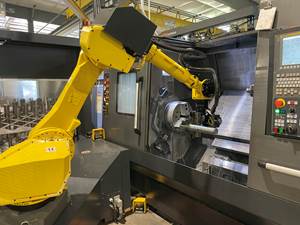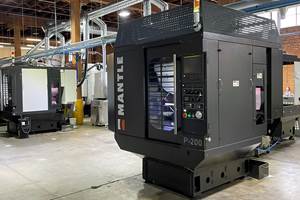Are Employees Really Replaceable?
Although an individual might consider themselves to be replaceable, an organization should not see their employees that way.
Share

.png;maxWidth=45)
DMG MORI - Cincinnati
Featured Content
View More
ECi Software Solutions, Inc.
Featured Content
View More







Hwacheon Machinery America, Inc.
Featured Content
View More
Employee turnaround in any business is inevitable and the reasons why are endless. At times, the changes are employee-driven and at others they are employer-driven. Employees need compensation, a solid team around them and a positive work environment. Metalworking companies, in turn, need dependable skilled labor, positive attitudes and the ability to work within certain parameters. So, how do we make sure both the employee and the company feel valued and maintain core attributes?
Somewhere along the way, someone invented the phrase, “everyone is replaceable.” My feelings differ. If everyone truly is replaceable, then why do we conduct annual reviews and promote employee engagement? Why do we emphasize team environments, evaluate exit interviews and advocate organizational health? Does living with the attitude that “everyone is replaceable” devalue those around us? I suggest that, although an individual might consider themselves to be replaceable, an organization should not see their employees that way.
It is usually pretty easy to notice when someone’s behavior makes them a poor fit on a team. Handled properly, these cases often get corrected. For instance, an employee’s consistent tardiness is noticed by their colleagues. They might get reprimanded by management or change their behavior due to peer comments. But what about those individuals who, even when their actions are suspect enough to draw attention, continue to produce at a high level and whose negative behaviors become tolerated? At what point should someone intervene, and at what point do we become responsible for someone else’s action? When should the employee recognize themselves as being replaceable, and when should someone else point it out?
I recall working with a person who routinely produced and delivered at a high level despite negative behaviors. This employee was known to take extended breaks and play games on company time. They were simply not a team player. After the company exhausted what seemed like every option available, it became apparent that this person thought their work was above that of the company and, most importantly, that of their colleagues. Although the company understood the importance of this person’s work (which bordered on being irreplaceable) the path became clear: Everyone may not be replaceable, but this person became so.
At a certain point, we recognize those within our organization whom we have focused on improving and those we have not. How can we change the thought process from replacing to retaining? Looked at another way, when should an employee feel the company that they work for is replaceable?
Recognizing and participating in a healthy atmosphere is as enjoyable as it is effective. Relying on colleagues to help when the workload becomes exhausting, picking up the slack when a team member needs a personal leave of absence, or simply being there for someone when they need assistance — all of these things have a rewarding feel to them. When we feel needed and help solve a problem, we lose the feeling of being replaceable. Instead, we come to rely on each other and work together.
Recently at Titletown Manufacturing, we have had three individuals leave for other jobs and then return. Honestly, this is one of the aspects we are most proud of within our organization. All of those who left did so for typical reasons; opportunity, logistical decisions, compensation and atmosphere all played a role in the actions to leave and to return. However, speaking with these people on their return interviews, all expressed that the Titletown Manufacturing atmosphere most greatly influenced their return. In other words, although we did allow the employees to pursue other options, we did not treat them as replaceable and made sure to let them know that they were welcome back.
The next time the term “everyone is replaceable” comes up, consider the context. Be confident in your work but keep humility in your heart. Remain accountable for your actions and accept the consequences along with the accolades.
About the Author
Tim Sanders
Tim Sanders is the operations manager for Titletown Manufacturing, a metalworking and fabrication shop located in Green Bay, Wisconsin. Email tim@titletownmfg.com or visit titletownmfg.com.
Related Content
Same Headcount, Double the Sales: Successful Job Shop Automation
Doubling sales requires more than just robots. Pro Products’ staff works in tandem with robots, performing inspection and other value-added activities.
Read MoreHow to Pass the Job Interview as an Employer
Job interviews are a two-way street. Follow these tips to make a good impression on your potential future workforce.
Read MoreHow I Made It: Amy Skrzypczak, CNC Machinist, Westminster Tool
At just 28 years old, Amy Skrzypczak is already logging her ninth year as a CNC machinist. While during high school Skrzypczak may not have guessed that she’d soon be running an electrical discharge machining (EDM) department, after attending her local community college she found a home among the “misfits” at Westminster Tool. Today, she oversees the company’s wire EDM operations and feels grateful to have avoided more well-worn career paths.
Read MoreIn Moldmaking, Mantle Process Addresses Lead Time and Talent Pool
A new process delivered through what looks like a standard machining center promises to streamline machining of injection mold cores and cavities and even answer the declining availability of toolmakers.
Read MoreRead Next
The Importance of Positive Culture
One of the most significant developments I am seeing in manufacturing is a recognition of the potential value of fostering an encouraging culture for employees.
Read MoreSetting Up the Building Blocks for a Digital Factory
Woodward Inc. spent over a year developing an API to connect machines to its digital factory. Caron Engineering’s MiConnect has cut most of this process while also granting the shop greater access to machine information.
Read MoreBuilding Out a Foundation for Student Machinists
Autodesk and Haas have teamed up to produce an introductory course for students that covers the basics of CAD, CAM and CNC while providing them with a portfolio part.
Read More
































.jpg;maxWidth=300;quality=90)









